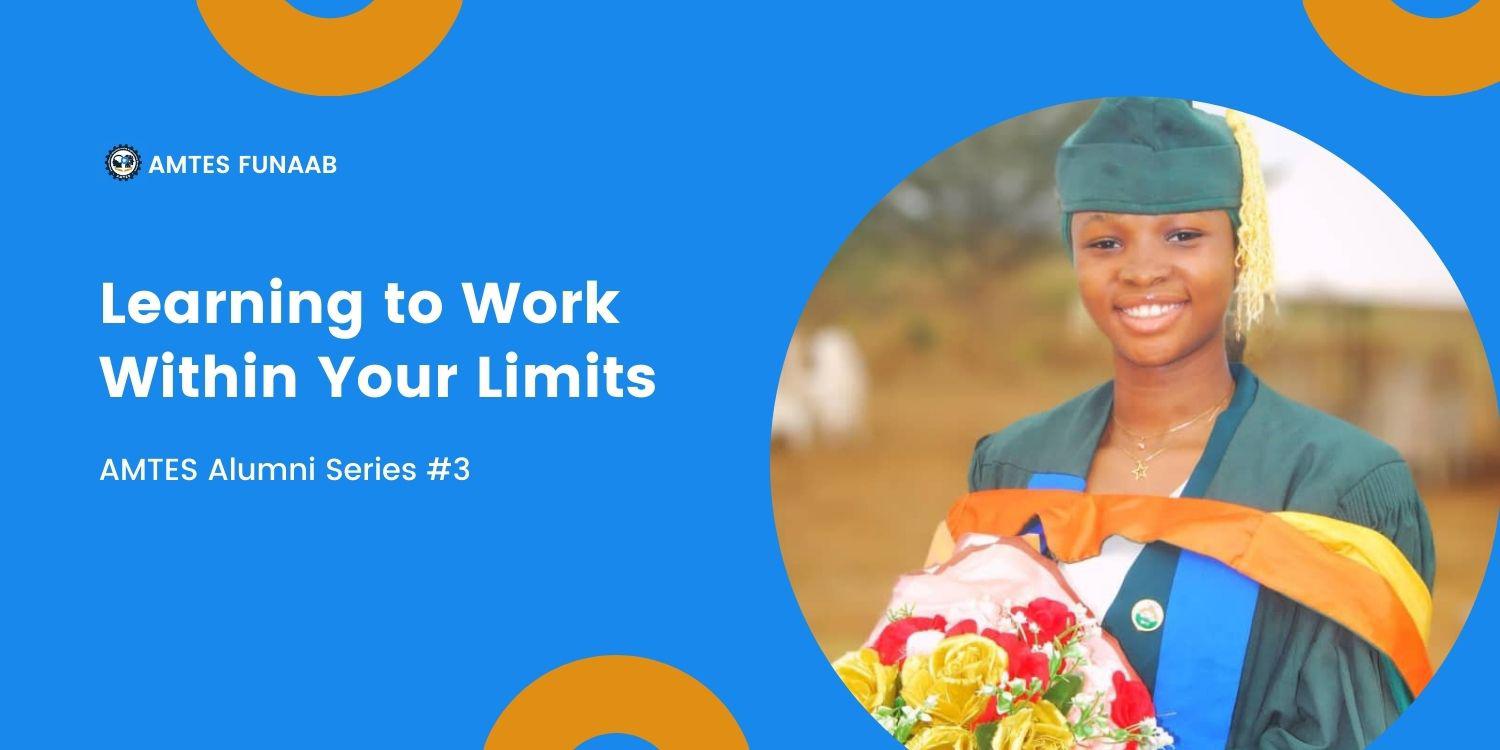Sakira Daodu, an elite among many others in her time in FUNAAB. From joining the science department in secondary school, to pursuing a career in data analysis (among her many other skills), a story of passion, resilience, hard work and many more started to breed.
Upon entering the Mechatronics department in FUNAAB, Sakira was determined to give it her all which manifested as a strong second class upper.
Her strong passion in dealing with data led to the pursuit of a career in data analysis. And while she believes she isn’t exuding enough aura, she definitely has many more skills to boast about including 3D animation and project management.
In this interview, Sakira shares her journey and discusses the challenges faced in studying engineering in most Nigerian universities and ways to overcome them.
Hi, Sakira! How was your day? I’m Daniel Ohachor from the AMTES bloggers.
Hello Daniel. My day was good, yours?
My day was also wonderful and I want to thank you for agreeing to this interview.
It is a pleasure, once I know I’ll be helping someone coming behind me.
That is so good to hear. I have about 5-10 questions for you today, and I hope you have enough time to spare.
I have about enough time to spare on that, go on please.
Thanks once again. I start off by asking from your life around 300 level in FUNAAB. What was your first job search experience like? Could be an internship also.
Thinking back, it was really tedious, awful and time consuming. I was missing a proper CV even after trying to use online CV creators like glazier and some others. I learned one thing from this experience though, these tools won’t make a successful CV in Nigerian companies. They did not also give me what I wanted. One good help you can get in situations like this is being in communities of like minded seniors along with a skill. I was later able to intern at CodeLabs though. So in summary, being social will help in the long run.
Interestingly, I also tried creating a CV a few days back only to realize I did not have meaningful skills to place within it.
You certainly should try learning as much skill as possible if you’re looking to be employed. With nothing to offer, you surely won’t be paid for anything—meaning no employment.
One of my major goals at this point is that. Thanks for the feedback. How did you successfully land your current role?
At this point, I’m focusing on upskilling so I’m not working. Let me go back to how I landed my first role though. Applying for the internship wasn’t so tedious and a lot of skills weren’t really required. At that point though, I had sharpened my CV to a good point and was really helped by an online program I was participating in.
What surprised you most in transitioning from academic to professional life?
Communication, funny as it may sound. In academic life, without good communication skills, you may still have top grades but the reverse is the case for professional life. While working—with poor communication skills—output from you will be reduced.
Adaptation is also key.
True, as long as an HOC exists, you may not even need to communicate with your lecturers.
Exactly. Though adaptation is in every phase of life, it is on a much higher level with professional life.
Good insight, I guess I have to work on my communication and adaptation skills too. What was your most successful exam preparation technique?
For me, starting early was the key. As early as the first or second week and if any issues arise, people with better grades that understand it better would suffer until I understand. Combining the use of past questions and the lecturer’s behaviour makes the course in its easiest form.
Rigorous, but it is still the best preparation technique I guess.
That solely depends on the person in question. For some, it may be the best and for others it may not.
Noted. How did you balance theoretical learning with practical application? Majorly in your final project.
Laughs…
I am contemplating between telling the truth and telling lies. I would generally advise learning outside the box, outside what you were taught if you want to get practical.
Hmm! The truth will be much appreciated. What resources proved most helpful during your academic journey?
(1) The lecturer’s note—mainly the questions provided in it. (2) Past questions—This is a lot more important most times, but it still depends on the type of lecturer in question. (3) Friends are better than you—Avoid using AI for any mathematical solution, meeting a friend that can solve it would be a lot better. AI can only help with breaking down complex concepts.
How did you manage academic stress and prevent burnout?
Ah! I don’t believe I’ve successfully prevented burnouts, though academic stress can be managed. In FUNAAB here, academic stress is very hard to prevent. There might be those that have successfully prevented it, but I highly doubt it can be prevented mostly during exam period.
So, you didn’t really have the skill to prevent burnout?
Well, one major thing I did through my time in FUNAAB was nothing. Just forget about the consequences of doing nothing and don’t disturb yourself anymore. Knowing your limit is key in this method though and forget regrets. For instance, during exam periods, when the level of assimilation is close to zero, I’d rather go to sleep than force myself further. Wake up moments later, eat or watch movies for about an hour, then bounce back to studying.
Wow! This is nice. So, basically knowing one’s limit is key. What advice would you give current students in search of jobs on job preparation?
Like I said earlier, learn a skill outside the scope of school. This skill is what will help you in getting a job most times. I’m not saying certificates are useless though, but the job for that always comes later than you would anticipate. Your additional skills on the other hand come a lot faster than this.
What technical or soft skill would you recommend students develop on time?
For technical skills, learn project management apart from coding and development.
For soft skills, ensure you can write well. Both technical writing and any other type of writing. Microsoft skills like excel and PowerPoint cannot be avoided.
Really! How did you continue learning rapidly evolving technological landscapes?
Firstly, to learn rapidly, you must be a good learner. Another is consistency. Adaptation through networking would also be helpful. That way, you’ll know of changing technologies on time.
What would you say of a slow learner?
Knowing how to manage your time would be key for that.
Well, I guessed I’ve exceeded the number of questions I’m allowed to ask. Thanks a lot for this information. I learnt a lot.
You’re welcome, do have a good night.
Thank You!
This tells us more than I ever would in any blog. It basically shows that school isn’t only about coming to class and bagging a first class—as we all wish. Extra work, gaining knowledge and many more would be really profitable going into the outside world.
Sakira Daodu, from everyone in AMTES, we celebrate you. Continue to show your impact in all you do.
If you’d like to connect with her, you can reach her via linkedin

